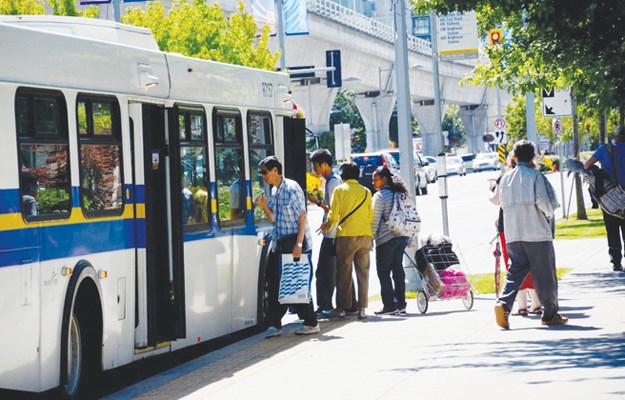Is the City of Richmond justified in promoting the ‘yes’ side of the upcoming Metro Vancouver transit tax referendum?
Jordan Bateman of the Canadian Taxpayers’ Federation thinks not.
“They’re trying to spend millions of dollars, everything from $4 million from TransLink down to tweets from city staff, to con taxpayers,” said Bateman, who is procuring support to oppose the Metro Vancouver Mayor’s Council’s proposed 0.5 per cent regional sales tax that will fund TransLink services and projects, such as a new Pattullo Bridge and light rail in Surrey.
On Twitter, while not explicitly endorsing a ‘yes’ vote, the city has re-tweeted and linked to partisan websites and columns, even though city council has not officially endorsed any one side of the March referendum.
Mayor Malcolm Brodie said there is a distinction between advertising information and awareness as opposed to expressing an opinion.
But the city has yet to inform the public about the ‘no’ side.
Bateman called the de-facto endorsements “banana republic” democracy in action.
“It’s a ridiculous violation of the city’s democratic principles. Without having council direction they shouldn’t be endorsing the referendum,” said Bateman.
The referendum is uncharted waters for local governments, given that it’s the first time in Canada the public is being asked to vote on a tax increase, according to Andrew Coyne of the National Post.
“But even if council does (endorse) it, taxpayers’ resources shouldn’t be spent on political campaigns,” he added.
The issue at heart is the fact councillors are representatives of the public, which is being tasked to decide on the tax.
Support from Richmond City Council could best be described as wavering.
For instance, Coun. Alexa Loo expressed her opposition to the referendum process via Twitter, saying TransLink needs to “clean up its own house before taxing us.”
@TransLink needs to clean up its own house before taxing us! #turnstiles #RevenueCollection #GoodBusiness #HowDoYouStillHaveAJob?
— Alexa Loo (@alexaloo) January 16, 2015
Loo later clarified said she would still, reluctantly, vote to accept the tax, granted the money must be raised to pay for initiatives she supports.
Councillors Ken Johnston and Linda McPhail said they would support the proposal as well, despite running recent election campaigns to lower taxes.
“If we don’t say ‘yes’ we’ll be hung out to dry. My view is we should vote ‘yes’ because there’s no other plan,” said Johnston.
McPhail was also critical of the process.
Asked if it is incumbent upon the city to inform the public about the ‘no’ side, such as Bateman’s website, city spokesperson Ted Townsend said the city participated on the Mayor's Council in the development of the tax proposal via Brodie’s participation, “and our communications to date reflect that.”
Learn more about plans to provide better transit + transportation services for our region. http://t.co/OoSzFDFumK #CutCongestion #RichmondBC
— City of Richmond (@Richmond_BC) December 19, 2014
Brodie confirmed there was no vote from city council to direct staff to communicate partisan information. He said he would not oppose the city informing the public about the ‘no’ campaign.
“I wouldn’t have a problem with that,” said Brodie.
In fact, Brodie is — as an individual member on council — promoting an open discussion on the referendum.
“The whole referendum process can and should be criticized. It’s an abdication of the provincial government’s responsibilities and TransLink has made many mistakes in the past. They’ve been criticized, sometimes fairly, sometimes not,” said Brodie.
But when it comes to voting, Brodie believes a ‘yes’ vote would benefit the region.
“I’m convinced these improvements are necessary. They’re critical for the environment, they’re critical for moving people around.”
Should the referendum pass, over the next 10 years Richmond would stand to gain increased bus services, including a B-line to Metrotown, as well as more capacity on the Canada Line.
The Richmond Chamber of Commerce has stated it supports the tax.



